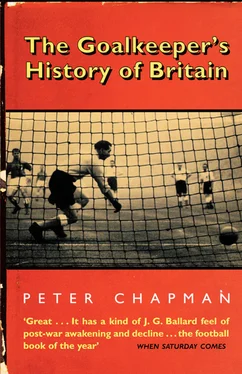Theirs was a style fairly common to central Europeans. Like their neighbours, Austria, they moved away from their adversaries to find open space and retain possession: ‘they reason that while they hold the ball the opposition can do nothing.’ But they couldn’t run away for ever. Today they would also find conditions not to their liking. Heavy fog had threatened to have the game postponed and the novel concession was being made, in their honour, of using a white ball for the whole game. But they were not accustomed to playing on ‘heavy grounds like ours in mid-season’ and the hard tackling of a team of ‘superior stamina’. They were, in short, about to discover it was a man’s game. There was not so much wrong with our football, the Standard man concluded, as the ‘jaundiced Jeremiahs’ made out. This set of opponents would no doubt come with their schemes and plans. We had no need, however, to worry unduly about tactics. Honesty would triumph above deviousness: ‘The English game is all right.’
Elsewhere, the programme noted the Hungarians’ tactics would differ from the Austrians, but not greatly. Rather than an attacking centre-half they came with a retreating centre-forward, Hidegkuti, the Budapest clerical worker, filed away mischievously in the wrong shirt. It had number 9 on its back, but he ‘usually lays well behind his inside-forwards’. From here he was apt to feed them with through passes, or run through himself on to passes they supplied him. It wasn’t, therefore, that England didn’t know about this. As Palmer had recommended, they chose not to worry unduly about it. In the event, the words of Meisl came back to haunt: faced with unusual methods, England teams were ‘prone to be baffled’.
The England defence retained control of their faculties for all of fifty seconds. In as many years, no foreign team had been able to storm the citadel. A sign that things might be otherwise came with the Hungarians’ first attack. Advancing from behind his midfield line, Hidegkuti collected the ball and hit a hard shot from the penalty area’s edge into the top right corner of Merrick’s net. A ‘stunned hush from the packed Wembley terraces’ greeted it, said a Hungarian report. It took their players several seconds to dance at the sight of the ‘white English ball in the net’. Geoffrey Greene, The Times reporter, also had his eyes on it: ‘it was meant to be a dove of peace. Instead it was the angel of doom’.
Within fifteen minutes the same player had scored twice more, one of them charitably disallowed by the referee. The appearance of a retreat that the deep-lying centre-forward gave, suddenly revealed itself as attack. Not only had the match programme given warning, history had seen it all before. In the last such challenge to England’s ‘island supremacy’, the nifty Normans had pretended to run away, then turned with the home team caught unprepared. First Hastings then, 900 less a few years on, Hidegkuti worked the same trick. The victim was a Harold, now as then. Harry Johnston, the Blackpool centre-half, couldn’t fathom whether to follow Hidegkuti and be caught out of position, or leave him to cause havoc at will. Mind befuddled, he looked through the mist for help, calling out across the pitch to his captain, Billy Wright: ‘What do I do, Billy?’ Wright’s reply was succinct and honest: ‘I don’t know, Harry!’
The score was 4–1 by half-time. In the second half England dug into their reserves of resilience and scored twice. So did Hungary. A combination of their easing up – a lack of ‘superior stamina’, possibly – and a first-rate performance by Merrick, kept the score to 6–3.
At five o’clock, a little over an hour after the end of the game, my dad walked the couple of minutes to Gloucester Road tube from the Natural History Museum, where building works were going on around a new air-conditioning system to fan the dinosaur bones and drawers of dead beetles. The papers were on the streets, the placards and men at the newsstands screaming the match outcome. He had to walk up and down the pavement by Baileys Hotel with the Evening News for a while to take it all in. ‘We thought foreign teams were nothing,’ he said. ‘The big games, the ones you were frightened about, were with the Scots.’ He’d had the chance to see the match but hadn’t taken up the offer for the sake of a lost afternoon at work. He was glad he had. He didn’t want to face the journey home: ‘If I felt like this, I wondered how bad it was for those who were in the stadium?’
As for all internationals, his youngest brother, Bim, was there. In his early twenties he had no worries about missing a half-day’s pay and no regrets that he had. It was an incredible occasion, breathtaking – actually, the very opposite of that. It made you realise how long you’d been holding your breath and didn’t have to any more. You’d felt it coming for so long, that the waiting was the problem. The tension was off. The hordes had finally stormed down from the hills. ‘To those who had seen the shadows of recent years creeping closer and closer, there was perhaps no real surprise,’ said Green of The Times. England must ‘awake to a new future’.
For the Wembley crowd the true shock had been Hidegkuti’s goal in the opening minute. It was one of four in the afternoon hit with such power as to make the dusky continental ‘weak in front of goal’ ghost look more pallid than old Harry Johnston. The second following within a few minutes of Hidegkuti’s initial strike made the spectators realise this was to be no flash in the pan. By the third, they were fully disposed to savour what was served before them.
That goal came after a sharply hit diagonal pass from the wing found Puskas on the gallop a few yards out from the right edge of Merrick’s area. Severely left-footed, Puskas easily controlled the ball but, skidding to a halt, found himself with his back half turned towards the goal. He may have appeared off-balance to those near him. He rocked back on his right foot, as if he might even fall and let the ball go beyond reach in front of him. Billy Wright, driven to new heights of dynamism at having been caught out by Puskas’s move into a dangerous position, ran and threw himself at the ball in a sliding tackle. He aimed to sweep it out of play for a corner kick and on the damp turf his momentum carried him into the crouched row of photographers across the touchline. The problem was he didn’t have the ball with him.
Puskas was the ‘tubby brains’ of the Hungarian attack. In addition to his plastered-down, centre-parted hair, he was short and of square frame. In technically polite terms he had a low centre of gravity. He hadn’t been unbalanced at all, and placed the studs of his left boot on the ball to drag it back swiftly out of Wright’s path. In a continuation of the same movement, he pirouetted on his right foot, drew his leg back and hit an unstoppable shot. Merrick, knees buckling, hardly had time to lift his hand.
Billy Wright witnessed this as he detached himself from the sprawl of grey-coated cameramen and dislodged trilby hats. Stanley Matthews was off in the fog on the right-wing but four decades later could still clearly see Puskas’s goal in his mind’s eye. The Hungarian report observed how the crowd ‘applauded for a very long time’. What they’d seen had been so simple that anyone in British football would have been proud to have done it. The footwork was perfectly no-nonsense, and effective enough to dump the England captain on his backside. It was rounded off with an example of shooting to equal anything England’s own forwards could have provided. It was brilliant, might even have been very British, yet was a million miles beyond us.
Puskas’s ‘drag-back’ captured the imagination sufficiently to be given the name. In scarcely a second, it fused elements of the game – deftness and directness, skill and shooting power, the scurrilous tactical stuff of foreigners and the straightforward decency of home – thought unfusable. It was a moment of football creation and for England the moment of much wider defeat. We had to acknowledge we were beaten. What the crowd witnessed wasn’t some overseas reverse, explained by the quirky things that went on abroad and distant enough to be forgotten. It had happened here, on our turf and before our own eyes.
Читать дальше












